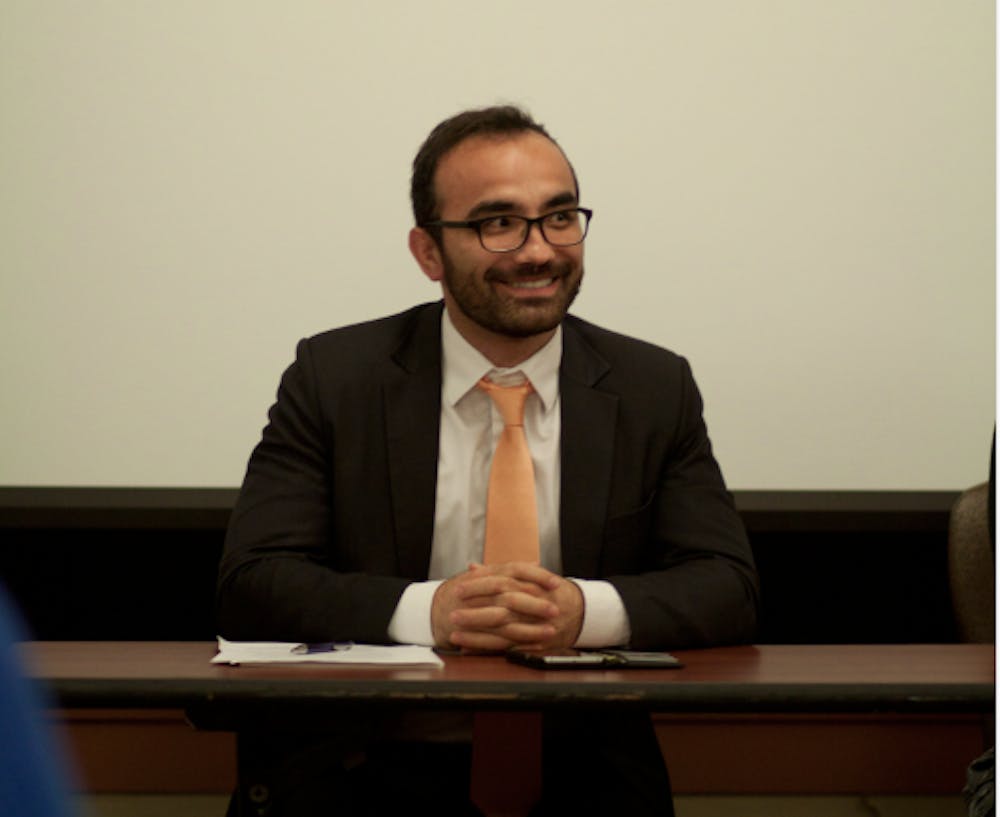By ROLLIN HU For The News-Letter
On Tuesday, Oct. 13, students had a discussion on the Israel-Palestine relationship in Charles Commons Salon C. The
Foreign Affairs Symposium (FAS), Hopkins American Partnership for Israel (HAPI) and J Street U organized the event and invited Jerusalem-native Professor Mohammed Dajani of the Washington Institute to give a talk. Professor Dajini founded the Al Wasatia movement of moderate Islam and is active in Advocates for Peace. Senior Michael Weiss of HAPI promoted the event.
“[Dr. Dajani] famously took a group of his Palestinian students to the site of the Auschwitz concentration camp in Poland and arranged for a group of Israeli students to visit Palestinian refugee camps in the West Bank,” he said.
Executive Director of Hopkins Hillel Rabbi Debbie Pine expressed her view on the issue in the context of differing perspectives about victimization.
“Who’s the victim here? You know, Palestinians say they’re the victim, Israelis say they are the victim, and what I found was so profound about this visit is he very publicly said, ‘Look, we’re both victims,’ just as Palestinians feel victimized in this conflict, Israelis are victims of the Holocaust, which was true and real and he very publicly acknowledged that there were victims on both sides,” she said.
Many students were excited to hear his talk. However, Dajani was unable to attend the event, so Pine and Ryan Calder, professor of sociology and Islamic Studies at Hopkins, took questions from attendees. Discussion topics included the historical context of Israel and Palestine, the roots of the conflict and potential remedies to the situation.
Senior Adam Eckstein of FAS described the cooperation between student groups to make the event possible.
“We [the FAS] helped out with logistics and planning of the event itself. Michael Weiss, who is the head of Hopkins American Partnership for Israel, got in contact with Dr. Dajani who basically was happy to come and speak. From there it’s just finding a place and setting up and getting people to show up,” he said.
Despite Dajani’s absence, many students and organizers felt that the event was still a success in promoting dialogue on the issue of Israeli-Palestinian relations.
Calder expressed gratitude for the planning of the event and was pleased with the overall result.
“Well I think the students who organized it from the organizations such as HAPI, FAS and J Street U did a great job. It was a real shame that Dr. Dajani wasn’t able to show up, but under the circumstances, the students had some really great things to say and so we had a nice discussion,” he said.
Students, including J Street U President Benjamin Schwartz, expressed gratitude and admiration for Calder’s willingness and ability to lead the event despite the absence of Dr. Dajani.
“I just want to say first of all, as disappointed as we were that Dr. Dajani was not able to make it, Dr. Calder and Rabbi Pine stepped up to the plate and led an incredible discussion on Israel and Palestine and led the group through the Israeli and Palestinian narratives in a way that I have not seen at Hopkins before. That’s something I’m really proud of,” he said.
However, Schwartz hopes to have Dajani come to Hopkins in the future.
Senior Adam Eckstein also echoed this feeling of success despite Dajani’s absence.
“Well unfortunately, we were unable to have Dr. Dajani here, but I think it was great that we had Dr. Calder as a back-up. He’s incredibly knowledgeable and it’s always nice to have the opportunity to just speak in a setting outside of a classroom and just have this kind of conversation. So I think that despite the disappointment, it was good,” he said.
Eckstein elaborated on the importance of learning outside the classroom.
“There’s only so much learning that can take place in a classroom and through a lecture,” Eckstein said. “It’s just a great opportunity to get people talking and learning and hearing different perspectives. I think it’s incredibly important and is something you can never have enough of.”
Sophomore Martin Feuerstein-Mendik of J Street U explained how having this event was important to raising the overall issue of Israel and Palestine on the Hopkins campus.
“I think that our community... sadly is kind of apathetic to this issue. The fact that our Israel groups are quite small at the moment is not a good sign. This [talk] really brings attention to the issue,” he said.





